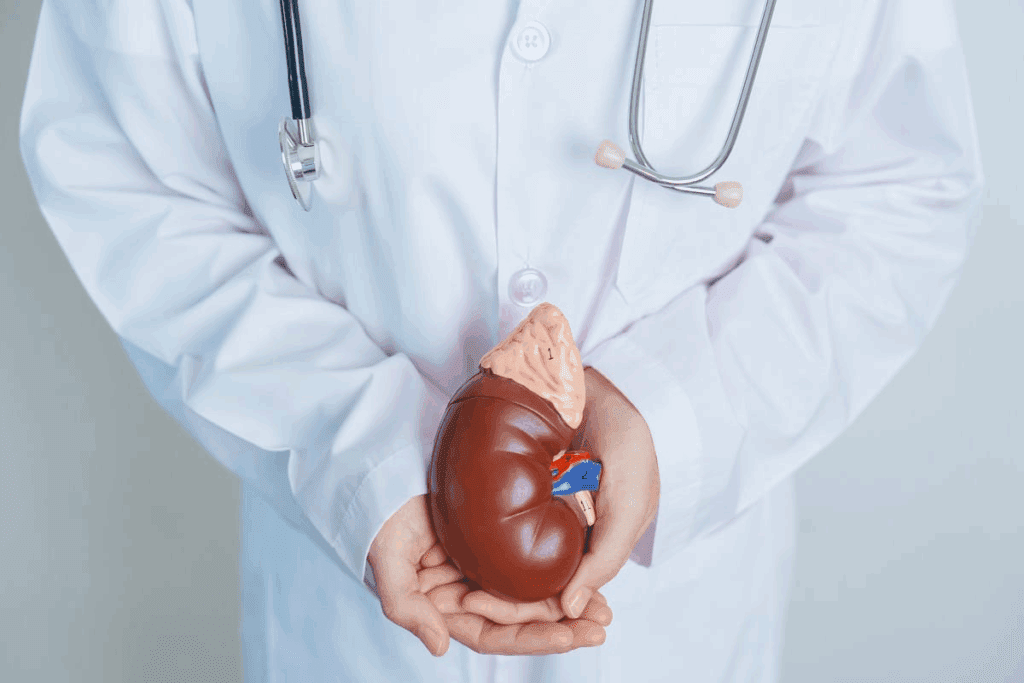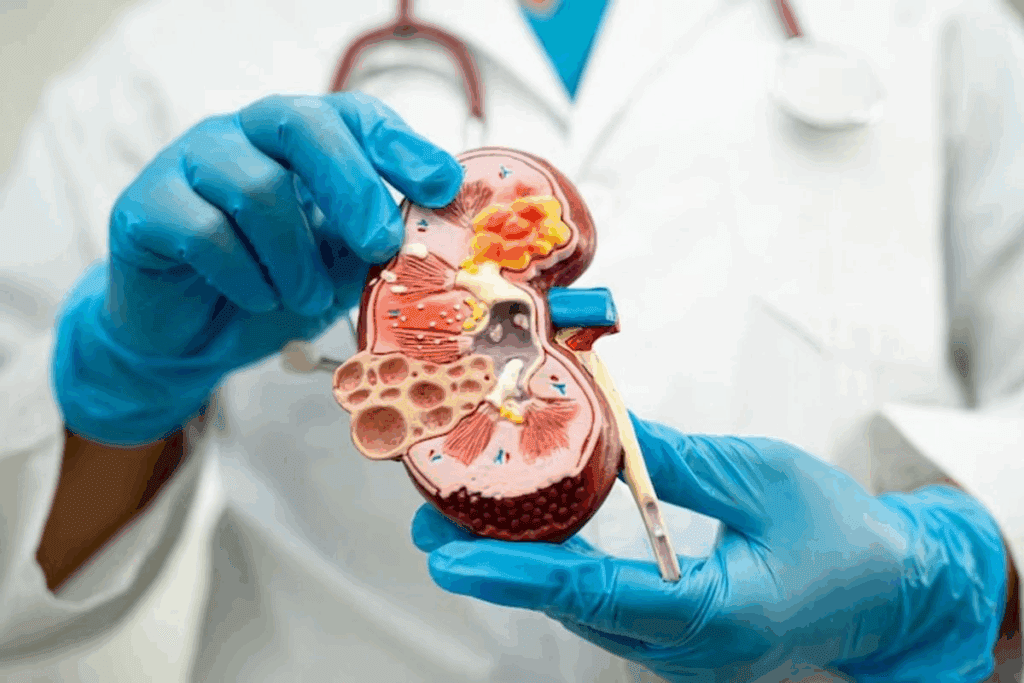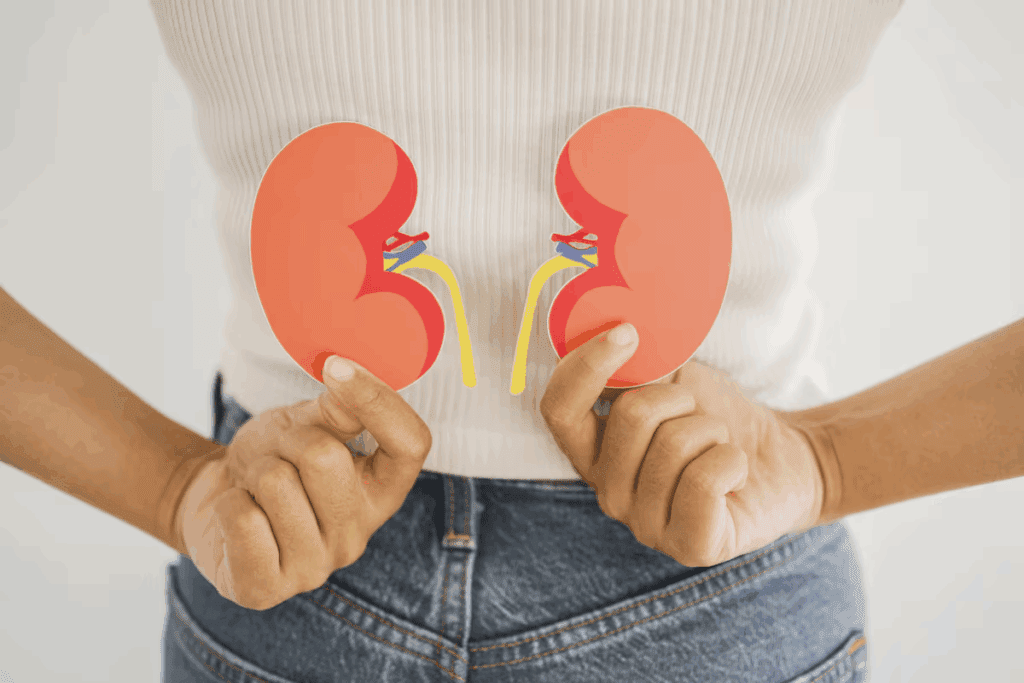Last Updated on November 25, 2025 by Ugurkan Demir

Kidney stones are a common health issue that can lead to severe complications if left untreated. According to the NCBI Bookshelf, renal calculi occur in 1 in 11 people at some time in their lifetimes, with men affected twice as much as women.
Untreated kidney stones can cause persistent pain, urinary tract infections, and potentially permanent kidney damage or failure. In severe cases, stones stuck in the ureter for months may result in sepsis, a life-threatening condition. At Liv Hospital, we emphasize the importance of seeking medical attention to avoid these complications.

It’s important to know how kidney stones form to prevent and manage them. Kidney stones happen when certain minerals in urine are too high. This causes crystals to form into stones.
Kidney stones form when minerals in urine concentrate. This can happen if you don’t drink enough water, eat certain foods, or have certain health issues. When urine is too concentrated, minerals like calcium and oxalate can turn into stones.
Genetics, lifestyle, and health conditions play a big role in getting kidney stones. For example, people with a family history of stones are more at risk.
There are four main types of kidney stones, each with its own causes and features. The most common types are:
| Type of Kidney Stone | Causes and Characteristics |
| Calcium Stones | High levels of calcium in the urine, often due to diet or medical conditions. |
| Uric Acid Stones | Associated with dehydration, high-protein diets, diabetes, and obesity. |
| Struvite Stones | Form as a result of urinary tract infections (UTIs). |
| Cystine Stones | Rare, caused by a hereditary disorder leading to excessive cystine in the urine. |
Several factors can increase your risk of getting kidney stones. These include:
Knowing these risk factors and types of stones can help you prevent them. By taking preventive steps, you can lower your chances of getting kidney stones.

It’s key to know the signs of kidney stones to get help fast. These stones can cause mild to severe pain and other issues. We’ll talk about the common signs and when they mean you need urgent care.
Kidney stones often cause sharp pain that spreads from the back to the belly or groin. This pain, called renal colic, can be very intense. You might also feel:
Table 1: Common Symptoms of Kidney Stones
| Symptom | Description |
| Severe Pain | Often radiating from the back or side to the lower abdomen or groin |
| Nausea and Vomiting | Commonly associated with the severe pain |
| Hematuria | Blood in the urine, which can be microscopic or visible |
Some kidney stones can pass without harm, but others need urgent care. Look out for:
“If you experience severe pain or any signs of infection, seek immediate medical attention. Untreated infections can lead to serious complications, including sepsis.”
Ignoring kidney stone symptoms can make them worse. The pain might get more intense, and the risk of infections or kidney damage grows. Sometimes, a stone might pass on its own, but often, medical help is needed to avoid lasting damage.
It’s vital to spot kidney stone symptoms early to avoid serious problems. If you’re feeling any of these symptoms, seeing a doctor is a must for the right treatment.
Untreated kidney stones can start a chain of problems. They begin with sharp pain and can lead to serious health issues. The body tries to pass the stone, causing a lot of discomfort and complications.
In the first days without treatment, the main symptom is severe pain. This pain, called renal colic, can move from the flank to the lower abdomen. The pain is often described as one of the most severe.
Some people also see blood in their urine, known as hematuria. This blood can be tiny or visible. As the stone moves, the pain and symptoms can get worse.
Without treatment for weeks, the risk of complications grows. One big worry is urinary tract infections (UTIs). UTIs can lead to kidney infections, which are serious.
Ignoring kidney stones for a long time can also block the urinary tract. This blockage can cause urine to build up, swelling the kidney. If not treated, this can damage the kidney permanently.
After months of ignoring kidney stones, the damage can be severe. There’s a big risk of chronic kidney disease (CKD) or even end-stage renal disease (ESRD).
Also, UTIs and blockages can cause more problems. These can lead to sepsis, a dangerous condition. This shows why it’s critical to get medical help for kidney stones.
Untreated kidney stones can cause persistent pain, changing a person’s life in big ways. The pain from kidney stones is often described as one of the most severe pains. If not treated, this pain can become chronic, affecting both physical and mental health.
The pain from kidney stones starts as sharp and severe, then turns into a dull ache if the stone doesn’t pass. This chronic pain makes it hard to manage and can affect daily activities. The pain spreads from the flank to the lower abdomen and groin, making it hard to find a comfortable position.
Characteristics of chronic pain from kidney stones include:
The psychological impact of chronic pain from untreated kidney stones is significant. Continuous pain can lead to frustration, anxiety, and depression. It can also affect mood, causing irritability and reducing enjoyment of daily activities.
The emotional toll of chronic pain can manifest in various ways, including:
Persistent pain from kidney stones can make it hard to do daily tasks and work. Simple activities like sitting, standing, or walking become challenging. The pain can also disrupt sleep, making the problem worse.
| Activity | Impact of Kidney Stone Pain |
| Work Productivity | Reduced efficiency, frequent breaks |
| Daily Tasks | Difficulty in performing routine chores |
| Sleep | Disrupted sleep patterns due to pain |
We know living with kidney stones is tough. Our goal is to provide care that eases the pain and improves life quality. By treating the pain’s root cause and providing the right treatment, we help people feel better and get back to their normal lives.
Untreated kidney stones can lead to urinary tract problems. These include infections and obstructions. They can seriously harm the urinary system’s function.
One big problem is recurrent urinary tract infections (UTIs). Stones can block urine flow, making it easy for bacteria to grow. This can cause:
Recurrent UTIs can really lower a person’s quality of life. They cause pain, discomfort, and emotional stress. It’s key to treat kidney stones to avoid these issues.
Untreated kidney stones can also cause bladder dysfunction. Stones can irritate and inflame the urinary tract. This might lead to:
Bladder dysfunction can really mess up daily life and overall health. It’s vital to tackle kidney stones to lessen these problems.
Urinary obstruction from kidney stones can cause serious issues. These include:
Urinary obstruction can harm the urinary tract and kidneys for a long time. It’s critical to treat kidney stones quickly to avoid these problems.
Untreated kidney stones can severely damage the kidneys, affecting their function. When stones block the urinary tract, they cause various complications that harm kidney health.
Untreated kidney stones can lead to hydronephrosis, a condition where the kidney swells. This happens when a stone blocks urine flow, causing pressure in the kidney.
Hydronephrosis can cause a lot of discomfort and can lead to permanent kidney damage if not treated. The swelling can also reduce kidney function. In severe cases, it can cause infection or even kidney failure.
Several factors contribute to permanent tissue damage from kidney stones:
These factors can cause scarring and fibrosis in the kidney. This impairs its function.
Untreated kidney stones can lead to chronic kidney disease (CKD). CKD is a gradual loss of kidney function over time. Recurrent obstruction and infection from kidney stones can speed up this process.
| Stage | Description | Impact on Kidney Function |
| 1 | Obstruction due to kidney stones | Initial reduction in kidney function |
| 2 | Development of hydronephrosis | Increased pressure and risk of infection |
| 3 | Permanent tissue damage | Irreversible loss of kidney function |
The table shows how kidney stones can progress to CKD in stages. Each stage has significant effects on kidney health.
“The timely treatment of kidney stones is key to prevent long-term kidney damage and reduce the risk of chronic kidney disease.”
We stress the need to seek medical help if symptoms don’t improve or get worse. Early treatment can greatly improve outcomes for those with kidney stones.
Not treating kidney stones can lead to serious problems. These include sepsis and acute kidney failure. These issues can harm your quality of life and even threaten your life.
Sepsis is a dangerous condition caused by untreated kidney stones. It happens when bacteria from the stones get into the blood. This can cause a severe reaction in the body, leading to septic shock.
Sepsis can cause blood pressure to drop, organs to fail, and even death. It’s vital to treat infected kidney stones early to avoid sepsis.
If you have symptoms like fever, chills, or flank pain, get medical help right away. Early action is key to preventing sepsis.
Another serious issue is complete urinary obstruction. A stone can block urine flow, causing urine to build up in the kidneys. This can lead to severe pain and permanent kidney damage if not treated.
| Complication | Description | Potential Outcome |
| Sepsis | Infection enters the bloodstream | Septic shock, organ failure, death |
| Complete Urinary Obstruction | Blockage of urine flow | Permanent kidney damage, hydronephrosis |
| Acute Kidney Failure | Sudden loss of kidney function | Need for dialysis, chronic kidney disease |
Acute kidney failure is another risk of untreated kidney stones. It happens when the kidneys suddenly can’t filter waste. This can be due to blockage or infection damage.
It needs quick medical help, often dialysis, to fix the kidneys and prevent lasting damage.
In summary, untreated kidney stones can lead to serious and life-threatening problems. It’s critical to seek medical help quickly. Knowing these risks helps patients make better choices for their health and avoid deadly outcomes.
Kidney stones are often seen as a painful but manageable issue. Yet, ignoring them can lead to serious risks. We’ll look into the dangers of untreated kidney stones, focusing on mortality rates, high-risk groups, and severe cases.
Though rare, deaths from kidney stones do happen. A study in the Journal of Urology showed a higher mortality rate than expected, mainly in specific groups.
Here are some key statistics to understand the risks:
| Population | Mortality Rate | Study Findings |
| General Population | 0.2-0.3% | Low mortality rate in the general population with access to modern healthcare. |
| High-Risk Patients | 1-2% | Significantly higher mortality rate among patients with underlying health conditions or those who delay treatment. |
| Patients with Obstruction | 5-10% | Higher mortality associated with complete urinary obstruction due to kidney stones. |
Some groups face a higher risk of fatal outcomes from kidney stones. These include:
For these high-risk patients, quick action is key to avoid serious problems.
Several case studies show how kidney stones can be deadly. For example, a 45-year-old man with a history of stones developed sepsis and died.
These stories highlight the need for immediate medical care for kidney stone symptoms. They also stress the importance of thorough care for those at high risk.
In summary, though rare, kidney stones can be fatal, mainly in high-risk groups. It’s vital to understand the risks and take proactive steps to manage kidney stone disease to avoid severe and fatal outcomes.
Knowing when to seek emergency care for kidney stones is key. It can greatly affect the outcome and prevent serious issues. Kidney stones can cause severe pain and serious problems if not treated.
Certain symptoms mean you need to go to the hospital right away. These include:
If you have any of these red flag symptoms, go to the emergency room quickly.
When you get to the emergency room, doctors will do several tests. These tests help figure out what’s wrong. They might include:
These tests help doctors understand how serious your condition is. They guide the treatment you need.
When you go to the emergency room for kidney stones, tell the doctors everything. Be ready to talk about:
Telling the doctors all this helps them make the best decisions for you. It ensures you get the right treatment.
Treating kidney stones depends on the stone’s size, location, and the patient’s health. Each case is different, and we tailor our treatment to fit each patient’s needs.
For small stones with little symptoms, conservative management is often suggested. This includes:
This method works well for small stones and can prevent more serious treatments.
For bigger stones or those causing a lot of pain, surgical interventions are needed. Common surgeries include:
| Procedure | Description | Indications |
| Extracorporeal Shock Wave Lithotripsy (ESWL) | A non-invasive method that breaks up stones with shock waves. | Stones too big to pass naturally. |
| Ureteroscopy | A minimally invasive procedure using a small scope to remove stones. | Stones in the ureter or kidney. |
| Percutaneous Nephrolithotomy | A surgery to remove large or complex stones. | Large stones or causing blockage. |
At Liv Hospital, we use a multidisciplinary approach for kidney stone treatment. Our team includes urologists, radiologists, and specialists. We work together to give the best care with the latest technology.
We carefully evaluate each patient to find the best treatment. We look at the stone’s size, location, and the patient’s health and history.
Getting help quickly is key when dealing with kidney stones. Ignoring them can cause serious problems. These include ongoing pain, infections, and even life-threatening issues like sepsis and kidney failure.
Starting treatment early can greatly help patients. It’s important to avoid complications to keep patients’ lives good.
At Liv Hospital, we treat kidney stones in a team effort. We teach patients about the dangers of not treating them. This helps them make smart choices about their health.
Seeing a doctor right away can stop serious damage. We stress the need for quick action to help our patients the most.
Untreated kidney stones can cause ongoing pain. They can also lead to urinary tract problems. In severe cases, they might cause life-threatening issues like sepsis, complete blockage, or kidney failure.
Yes, in rare cases, kidney stones can be deadly. This is due to complications like sepsis, complete blockage, or acute kidney failure.
While rare, kidney stones can be fatal if not treated. People with pre-existing conditions are at higher risk.
Not passing a kidney stone can lead to ongoing pain and infections. It can also cause kidney damage or failure if it blocks the urinary tract.
Yes, dying from a kidney stone is possible. This can happen if complications like sepsis or acute kidney failure occur and are not treated promptly.
A stone stuck in the ureter for months can cause chronic pain and infections. It can also lead to kidney damage or failure due to prolonged blockage.
Untreated kidney stones can greatly affect your quality of life. They can cause chronic pain, psychological distress, and impact your daily activities and work.
Symptoms needing immediate medical attention include severe pain, fever, chills, vomiting, and trouble urinating.
Yes, untreated kidney stones can cause permanent kidney damage. This can happen due to prolonged obstruction, recurrent infections, or other complications.
Treatment for kidney stones includes conservative methods like pain management and hydration. Surgical options like lithotripsy or removal are also available, depending on the stone’s size and location.
NIH MedlinePlus. (2024, May 22). Crystals in urine. https://medlineplus.gov/lab-tests/crystals-in-urine/
Subscribe to our e-newsletter to stay informed about the latest innovations in the world of health and exclusive offers!